Jude Knight's Blog, page 44
June 12, 2022
Tea with Sophia and Felicity

“I worry about him,” said Felicity Wentworth. “He has a list, Aunt Eleanor.”
“Is that a bad thing?” the Duchess of Winshire asked. “Your brother is, after all, choosing a suitable countess as well as a wife. A list of appropriate qualities seems like a good idea.”
Sophia, Countess of Sutton and sister to both Felicity and Hythe, snorted. “It is a bad thing when the women Hythe thinks he wants would bore him witless in a week and make him miserable in a month,” she said.
“Oh dear.” Eleanor could see how that might be a problem.
“Hythe needs someone lively who will tempt him to see the fun in life,” Felicity declared.
“Hythe needs someone who will be his friend as well as loving him with all her heart,” Sophia corrected.
Eleanor sighed. “He is a grown man, and I have learned that it is a bad idea to try to interfere when our loved ones are determined on their course.”
Sophia’s eyes twinkled. “Unless they ask for our advice.”
“Sophia,” Felicity demanded. “What have you done?”
“Only suggested to Hythe that he should attend one of Lady Osbourne’s party and look over the wallflowers,” Sophia said, airily. She spoiled her air of innocence with a giggle. “I may also have suggested to Lady Osbourne that she might invite him to the same party as Amaryllis Fernhill, and make sure they can spend time together.”
Felicity’s mouth dropped open.
The duchess asked, “Amaryllis Fernhill, my dear Sophia? The one who…?”
Sophia nodded. “Yes, that Amaryllis Fernhill. The one who was supposedly stolen by the Faerie.”
Felicity was grinning. “The one Hythe was not able to take his eyes off all Season.”
“She is a perfectly nice young woman, Aunt Eleanor,” Sophia insisted. “Whatever happened, I am sure she is not actually ruined whatever the ton might think.”
The duchess had recovered her equanimity. “Well then, my dear girls. If Hythe chooses Miss Fernhill for his bride, it will be our job to make her acceptable to the ton. We cannot have any silly scandal marring the career of a diplomat of his skill.”
His sisters nodded. “Quite right, Aunt Eleanor,” Sophia said. “I knew we could count on you.”

The Husband Gamble is my contribution to The Wedding Wager, which you can find more about on my book page. Its out in September, so I’ll share more about Amaryllis and the Earl of Hythe in the coming couple of months.
Backlist spotlight: Farewell to Kindness

Helped by the earl who hurt them, hidden from the earl who hunts them, Anne and her sisters have been accepted into the heart of a tiny rural village. Until another earl comes visiting.
Rede lives to avenge the deaths of his wife and children. After three long years of searching, he is closing in on the ruthless villains who gave the orders, and he does not hope to survive the final encounter. Until he meets Anne.
As their inconvenient attraction grows, a series of near fatal attacks draws them together and drives them apart. When their desperate enemies combine forces, Anne and Rede must trust one another to survive.
Farewell to Kindness is Book 1 in the series The Golden Redepennings.
ExcerptThat night, Anne dreamt of dancing with Lord Chirbury. In her dream, they didn’t walk decorously away after the wild excitement of the dance, to find her sisters and go tamely home. In her dream, the first vigorous dance led to another, even wilder, and part way through the second he swung her out into the shadows as she’d seen some of the village men do with their wives and sweethearts. In her dream, he’d caught her up into his arms and pressed his lips to hers.
“Call me Rede,” he insisted, his voice husky as she’d heard it once or twice, his vivid eyes burning into hers.
In her dream, she confessed that she’d been thinking of him as ‘Rede’ ever since they met in his woods and picked berries together.
“Anne,” he murmured, holding her closer.
There was something not right about the embrace, about the kisses he showered on her face. Drifting awake, she acknowledged she expected more: not a hug such as Ruth or Kitty might give; not a flurry of pecks like those she received from Daisy and Meg.
She had never been kissed by a man, but something told her that, if Rede ever did kiss her, it would be a different kind of kiss to the ones her sisters gave. It would be a kiss that spoke to the strange, unsettling physical responses that troubled her body when he was near; when his gloved hand touched her hand or the small of her back; when his hard body tensed under hers as she leaned across to untangle the brambles; when he moved smoothly through the dance, displaying his strength and fitness, the lines and angles of the muscles in his thighs and shoulders. Or now, when she thought of all those things.
She felt herself blush in the dark. Such foolish thoughts. Rede—Lord Chirbury—wasn’t for her. With her past and her need to keep Kitty hidden, she could not be wife to a peer, and she would not be anything less than a wife. Quite apart from the morals of such a choice, she wouldn’t take any risks with Kitty’s chances of being reestablished in the life to which they’d been born.
The heat in her face increased, as she acknowledged to herself that she was rushing her fences. Apart from those few heated glances, which she—in her inexperience—might have misunderstood, Rede had shown no signs of wishing to bed her, let alone wed her.
The thought should have made her feel better. Odd, then, that she felt slightly disgruntled. Did she want him to proposition her? Like his impertinent cousin? Surely not.
But a small voice deep in the back of her mind said that she would like to know he desired her as she did him, even if they never acted on that desire. Which, of course, she assured herself hastily, they never would.
June 10, 2022
The Development of Democracy: government by the people

The Greek and Roman versions of democracy were not the only models of participatory government from which our own Western tradition draws. In Italy, after the fall of Rome, city states practiced a limited form of participatory democracy that included the election of temporary leaders. For the most part, only the nobility and large landowners could vote, though later wealthier merchants and skilled craftsmen demanded–and in some places received–voting rights. Later still, economic decline and other factors led to the rise of authoritarian monarchs and princes.
Meanwhile, in the far North, the Scandinavians practiced direct democracy at village and town level, with every free adult Norseman able to speak at the Ting, the assembly. Unusually, certain females could participate as well. If an issue could not be settled at the local level, it might be passed up to a higher level Ting, where representatives of a number of communities would rule on matters that affected an entire region or tribe. In 930 in Iceland, the first national assembly, the Althing, was established. It still continues today, one of the world’s longest serving Parliaments. Later, other Scandinavian countries, Switzerland and the Netherlands also established national representative assemblies.
In Ireland, the leaders of communities all had a voice in the Feis, the council of the King, until around 530.
Before the Magna Carta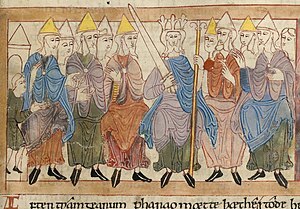 Those of us raised in the English tradition of democracy are often told that it started with the Magna Carta. But before that came the Witan and the Moot. These were the government, legislative, and judicial assemblies of Anglo-Saxon Britain, and they were adopted, with changes, by the Normans. The Witan was called by the King and comprised the individuals he wanted to include. Their job was to advise the king. In theory, the king did not have to listen to their advice, but these were powerful men with troops behind them. The balancing act between king and council was underway, and would continue for centuries.
Those of us raised in the English tradition of democracy are often told that it started with the Magna Carta. But before that came the Witan and the Moot. These were the government, legislative, and judicial assemblies of Anglo-Saxon Britain, and they were adopted, with changes, by the Normans. The Witan was called by the King and comprised the individuals he wanted to include. Their job was to advise the king. In theory, the king did not have to listen to their advice, but these were powerful men with troops behind them. The balancing act between king and council was underway, and would continue for centuries.
After the Conquest, the king appointed a permanent council, but would add to it from time to time on particular issues.
The Moot was the assembly at county or shire level.
The ‘shire moot’ was attended by the local lords and bishops, the sheriff, and most importantly, four representatives of each village. After the Conquest, this meeting became known as the County Court and it introduced the idea of representative government at the local level. (parliament.uk ~ Origins of Parliament)
In time, these two types of council would become the two Houses of Parliament: the House of Lords, the Council of the monarch, and the House of Commons, representatives of the shires and counties.
So what did the Magna Carta have to do with democracy?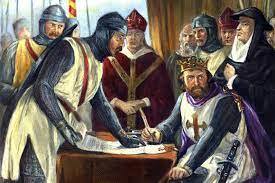 The issue was taxes. The King wanted to pay for his war in France. His barons were not happy. They rebelled, and the Magna Carta was the charter in which the King agreed he was not above the law. The Magna Carta established the law as something separate to the will of the monarch. This is the fundamental principle on which Western democracy is based–that the leader of a country is bound by its laws, though that principle was not the issue for most of the barons. They just wanted to make certain that the king could not impose ruinous taxes without the consent of his council.
The issue was taxes. The King wanted to pay for his war in France. His barons were not happy. They rebelled, and the Magna Carta was the charter in which the King agreed he was not above the law. The Magna Carta established the law as something separate to the will of the monarch. This is the fundamental principle on which Western democracy is based–that the leader of a country is bound by its laws, though that principle was not the issue for most of the barons. They just wanted to make certain that the king could not impose ruinous taxes without the consent of his council.
John signed the charter, and then repudiated it. Many of the barons went over to Louis of France. Then John died, and the advisers to the nine-year-old King Henry III coaxed the barons back to fealty to Henry by reinstating the Magna Carta. But the time Henry was an adult, had been confirmed many times, and was will known throughout England.
Four clauses of the 63 in the Magna Carta remain law today, and clauses 39 and 40 are particularly relevant to democracy.
“No free man shall be seized, imprisoned, dispossessed, outlawed, exiled or ruined in any way, nor in any way proceeded against, except by the lawful judgement of his peers and the law of the land.
“To no one will we sell, to no one will we deny or delay right or justice.” (parliament.uk ~ Origins of Parliament)
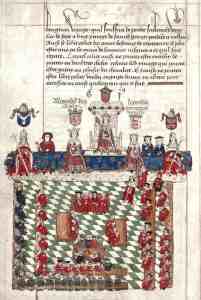 Representative government. Sort of.
Representative government. Sort of.Since the agreement was that the king needed his council to raise taxes, Henry began to call the council together more and more often. Parliament was the name given to the meeting of this council. In return to agreeing with the taxes, the barons asked for reforms, including the right to choose the king’s ministers, and have the king follow their advice.
When Edward, Henry’s son, became king, he began calling the representatives from around the country together more often. And he didn’t just summon the barons. Several times, he also summoned two representatives from each county, and two from each city or town. His successors went on waging war and raising taxes, and the assemblies kept on bargaining for something in return. From 1327, every English Parliament has included Lords, Commons, and the Monarch.
The theory of democracy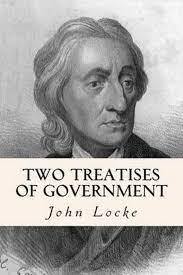 In the seventeenth century, John Locke built on the ideas of Aristotle and others to come up with a theory of the legitimacy of government. He held that government represents a social contract between the ruler and those ruled. He did not state a preference for democracy, oligarchy, or autocracy, but he did state that, if the ruler failed to meet his side of the social contract, the people had a right to rebel.
In the seventeenth century, John Locke built on the ideas of Aristotle and others to come up with a theory of the legitimacy of government. He held that government represents a social contract between the ruler and those ruled. He did not state a preference for democracy, oligarchy, or autocracy, but he did state that, if the ruler failed to meet his side of the social contract, the people had a right to rebel.
For all Power given with trust for the attaining an end, being limited by that end, whenever that end is manifestly neglected, or opposed, the trust must necessarily be forfeited, and the Power devolve into the hands of those that gave it, who may place it anew where they shall think best for their safety and security.
Next Friday, we’ll see how Locke’s ideas played out in the eighteenth century, in the American and then the French revolution.
Sourceshttps://www.britannica.com/topic/democracy
https://www.weforum.org/agenda/2019/08/countries-are-the-worlds-oldest-democracies/
June 8, 2022
Sunflower Season is live
June 7, 2022
The marriage mart on WIP Wednesday

This week’s excerpt is from The Husband Gamble, a short novella I am writing for The Wedding Wager.
The Earl of Hythe was already regretting his agreement to attend the party. The room he had been given was perfectly adequate. His valet Pritchard, who had been with him for years, had been busy while Hythe was in his bath. Pritchard knew exactly how Hythe likes things. He had organised the dressing room and the bedside table, and had moved the chairs in the seating area so that they were precisely aligned with the edge of the hearth, with the little table equidistant between the two and on the same ruler-straight line.
After he was dressed again, Hythe set his travelling desk on the desk provided, and checked the desk drawers. Lady Osbourne had provided quality paper and ink. The stack of paper needed to be tidied, as did the rest of the drawer contents. That task finished, Hythe had no further excuse for lingering in his room, getting in Pritchard’s way. Like it or not, he needed to go below and meet the other guests.
He blamed his sister Sophia, entirely. On second thoughts, he had opened himself to the attack. If he had never grumbled to her about the difficulty of finding a wife one could respect and even, perhaps, befriend, she would never have suggested that he put himself in the hands of the acclaimed matchmaker. One who had found matches, furthermore, for people whom Society had judged unmarriageable.
Even so, Hythe would never have agreed if the marriage of his sister Felicity had not left his townhouse appallingly empty. Felicity had followed him from one diplomatic post into another, keeping house for him. His servants were perfectly competent, but they would be horrified to be asked to sit down for a chat over breakfast or of an evening.
And, of course, no servant could be his hostess or be at his side during the social occasions that were so much part of his work.
“Excuse me, my lord,” Pritchard said.
Hythe stepped out of his way, and Pritchard, carrying Hythe’s dinner jacket as if it was the crown jewels, proceeded to lay the garment on the bed and return to the dressing room for the next item. “Dinner is at seven, my lord, with gathering in the drawing room from six thirty.”
It was Pritchard’s way of saying “You have at least two hours before dressing for dinner, so please go away so I can ensure that anything you might choose to wear has been inspected and, if necessary, restored to a standard suitable for the Earl of Hythe.”
Hythe repressed a sigh and bowed to the inevitable, though he only went as far as the passage, where he stood for a moment, his eyes shut, bracing himself to meet all those people.
It was only for a week. He could resist any plots by Lady Osbourne or her protégés for one week. One of them might be the one for you. He rejected the errant thought. Everyone knew that Lady Osbourne had wagered with her cousin that she could find matches for the most awkward, difficult and challenging of wallflowers and hoydens and the most unprepossessing of grooms.
Hythe knew that he had little to recommend him beyond his title and his wealth. Ladies seem to prefer a man of address, who could flatter them with elegant compliments and talk for hours about frivolous matters that bored Hythe witless. Someone at ease meeting strangers and comfortable in crowds of people.
For Hythe, social occasions were an ordeal. He could manage. He had memorised a hundred different meaningless but polite responses, and practiced them in front of a mirror. He had learned which ones to trot out on which occasion.
It was not so bad if he could find a meaningful conversation in which to immerse himself, but the ladies of Society and many of the men had no interest in topics that mattered. Hythe had discovered the trick of finding a quiet corner where he could take a few deep breathes before pasting on a smile and getting back to work.
The right wife would have the skills he lacked, as his sisters did. They were both brilliant political and diplomatic hostesses, and had been happy to give their brother the benefit of their skills. Until they married. Without them, life in Society was even more exhausting than before.
He had not been able to find what he needed as a man. What his title required made it even more difficult. The Earl of Hythe needed a countess who could burnish the reputation of the earldom and the family. Money was irrelevant. Looks were secondary. Behaviour…
Even in his thoughts, he could not agree that behaviour was everything. Important, yes. Hythe was the head of the Belvoir family, and no stain had ever attached to their family name. His parents had been renowned for their good ton as well as their wealth, their generosity, and their wide circle of friends. His sisters were models of propriety. Felicity, his younger sister, might at times allow her vivacity to bring her to the edge of proper behaviour, but never over.
However, Hythe wanted more from marriage than a countess who could be a good hostess and who knew how to behave. Perhaps, if he had contemplated marriage a few years ago, he might have chosen one of the insipid bird brains that seem to be the primary offering on the marriage mart. And perhaps, if he had been lucky, she might have learned to be an adequate countess.
Hythe also wanted a wife. He had watched his sisters find love matches. So had several of his friends. He was not convinced that a love match was a desirable thing — such an untidy excess of emotions did not appeal to him. In any case, he had never imagined himself in love, even when his friends were falling like flies for opera dances and Society beauties. He was probably not capable of the emotion.
The other kind of love he could manage very well. He held a deep and abiding affection for both of his sisters. He was sure he could be a fond and caring husband and father. All he had to do was find a wife he could talk to. It may be setting the bar too low to say a wife who did not irritate him, but that was precisely what he told Lady Osbourne when she buttonholed him in Town after Sophia had asked her for her help.
Someone who did not irritate him. Someone who was old enough and interesting enough to know her own mind and be prepared to have opinions and defend them. Someone who liked children and would be a good mother, for Hythe would need an heir, and hoped that his son might grow up with brothers and sisters.
Someone who knew how to behave as the wife of a diplomat and a peer — that went without saying, although he said it anyway. Someone who was at ease in social situations and prepared to exercise that mastery on his behalf, though he did not put that into words, unwilling to expose his deficiencies to that extent.
He waved away Lady Osbourne’s questions about appearance. Short or tall. Fair or dark. Plump or slender. What did those matter over a lifetime? “I want someone to grow old with,” he told Lady Osbourne, “should we be so blessed.”
He couldn’t spend the rest of the day leaning against the wall outside his room. He opened his eyes even as he took a stride down the passage, only to find his arms full of a warm fragrant female. Who gasped, and pulled backwards.
June 5, 2022
Tea with a nephew

This week’s excerpt is Eleanor’s first appearance in print, in the novel Farewell to Kindness.

The sun was setting on Saturday evening, and Rede was beside himself with frustration, before the Duchess of Haverford’s coach was finally seen tooling up the road to the castle.
He was waiting when she entered the front door, and she greeted him with pleasure. “Rede, darling. What a lovely surprise. Have you been waiting for me long?
“Such a circus in Deal. The electors were inclined to listen to the merchants, and the merchants did not favour Haverford’s man. Not at all.
“So I had to visit every shop in the town and buy something. The carriage, I can assure you, is laden. But Haverford believes that it may have done the trick.
“Just as well, dear, for I have enough Christmas presents for every one of my godchildren for the next three years. And some of them are not of the best quality, I can assure you.”
She was talking as she ascended the stairs, giving her cloak to a maid as she passed, her bonnet to a footman, and her reticule to another maid.
“You want something, I expect. Well, you shall tell me all about it at dinner. I left most of the food I purchased at the orphanage in Margate, but I kept a pineapple for dessert. Such fun, my dear, have you tried one?”
“No, dear aunt,” he managed to say, sliding his comment in as she paused to give her gloves to yet another maid. Or it may have been the first maid again.
“Well, today you shall. Join me in the dining room in—shall we say one hour?” And she sailed away towards her apartments, leaving him, as always, feeling as if he had been assaulted by a friendly and affectionate hurricane.
Over dinner, he laid all honestly before her. Well, perhaps not all. The lovely widow, betrayed by George, the three sisters, the little daughter. No need to mention that he’d played fast and loose himself with the lady’s virtue. Just that he needed to rehabilitate her. Just that he wanted to marry her and she had refused.
“She has refused you, Rede?” Her Grace was surprised. “But you are handsome, wealthy and charming. And rich. What does she object to?”
Rede hadn’t been able to work it out, either. “I know she cares for me, Aunt Eleanor. But she keeps saying no. The first time—to be honest, the first time I made a disaster of it. I told her… I gave her the impression that I only wanted her for a wife because she was too virtuous to be my mistress.”
Her Grace gave a peal of laughter. “Oh Rede, you didn’t.”
“I’m afraid I did. But the second time I assured her that I wanted her for my Countess.”
“And you told her that you loved her,” the Duchess stated.
“No. Not exactly. I told her I wanted to keep her safe. I told her I wanted to protect her.”
“I see. And I suppose you think if you bring her into society, she will consent to marry you?”
“I don’t know, aunt. I only know that she deserves a better life than stuck in a worker’s cottage in the back of nowhere working as a teacher so she can one day give her sister a decent life. If she won’t have me… Well, she has been to see a lawyer about a small inheritance she has coming. I thought perhaps I could make it a bit bigger. Without her knowing.”
“You do love her,” said the Duchess, with great satisfaction.
“Yes, but… Yes.” There were no buts. He loved her. At least he hadn’t told her so. He had no taste for laying his heart on the floor for her to walk on.
“You need to tell her so.” The Duchess echoed and denied his thinking, all in one short sentence. “She is probably afraid that you are marrying her out of a misplaced sense of duty. You are far too responsible, Rede.”
“No, she couldn’t think that. Could she?”
“Who knows? Well, I will do it. I cannot have my niece-in-law having her babies in scandal. I take it there is the possibility of a baby? You would not be feeling so guilty otherwise.”
Rede was without a response for a long moment, finally huffing a laugh. “Aunt Eleanor, a hundred years ago you would have burnt as a witch,” he told her.
Spotlight on “The Truant Lord Clairmont” in Sunflower Season

Lady Clairmont goes to a scandalous house party to retrieve her truant husband after his return to England from a nine-year absence. What she discovers is unexpected.
A short story in Sunflower Season a fundraiser collection for UkraineSUNFLOWER SEASON is a charity collection featuring stories (some never-been-published and some old favorites) by over 70 — that’s right — SEVENTY of your favorite Historical Romance authors. ALL royalties will be donated to humanitarian relief in Ukraine. This set will be released on June 7, 2022 and will only be available for a limited time. Preorder now and enjoy a summer of historical romance!
Featuring novellas, stories and novels by Sabrina Jeffries, Christi Caldwell, Amalie Howard, Virginia Heath, Caroline Lee, Golden Angel, Bree Wolf, Lori Ann Bailey, Nicole Locke, Natasha Blackthorne, Royaline Sing, Lenora Bell, Sabrina Jeffries, Amy Quinton, Janna MacGregor, Annabelle Anders, Rachel Ann Smith, Eva Devon, Sandra Sookoo, Tabetha Waite, Diana Bold, Sadie Bosque, Cheryl Bolen, Erica Monroe, Kate Bateman, Cara Maxwell, Tracy Sumner, Jenna Jaxon, Jane Charles, Eliza Knight, Mariah Stone, Robyn DeHart, Wendy LaCapra, Hildie McQueen, Madeline Martin, Amy Rose Bennett, Ava Bond, Kristin Vayden, Piper Huguley, Fenna Edgewood, Kathryn Le Veque, Caroline Linden, Nancy Yeager, Dawn Brower, Celeste Barclay, Lauren Royal, Michele Pollock Dalton, Glynnis Campbell, Rose Pearson, Erica Ridley, Sydney Jane Baily, Deb Marlowe, Rebecca Paula, Amanda Mariel, Christine Sterling, Ava Stone, Lauren Smith, Sawyer Quinn, Caroline Warfield, Jessica A Clements, Jude Knight, Anna St. Claire, Tamara Gill, Gina Conkle, Charlie Lane, Terri Brisbin, Bronwen Evans, Emmanuelle de Maupassant, Merry Farmer, Tammy Andresen, Cecelia Mecca, Meredith Bond, Christine Donovan, Lana Williams, Carrie Lomax, Eve Pendle, Bethany Bennett, Bianca Blythe, Maggie Dallen, Samara Parish, Anna Campbell and more????
Again, ALL proceeds will be donated to Ukrainian relief efforts. We are not affiliated with any charities but are only doing what we can to provide help for the innocent people who’ve lost so much as a result of this senseless tragedy.
Preorder at your favourite retailer. https://books2read.com/Sunflower-Season-For-Ukraine
June 2, 2022
The Development of Democracy: Part 1—the Ancient World
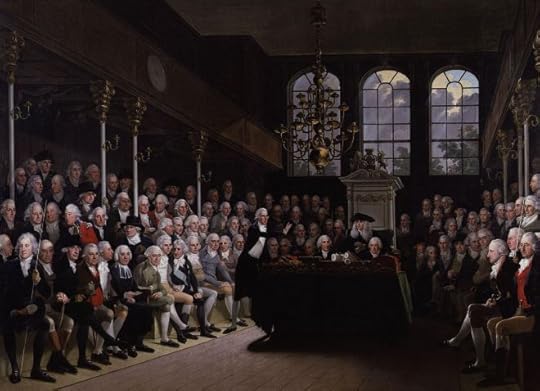
The Regency era I write about was on the cusp of major changes in democracy, as it was for industrialisation, criminal justice and law enforcement, the class system, global politics, scientific discovery, medicine, transportation, and many other aspects of how people lived. They had not yet achieved anything like a representative democracy in the modern sense of the term—that is, that government comprises people who have been elected by citizens to represent them. Indeed, apart from a lot of talking during the early years of the French revolution (universal male suffrage was proclaimed in France in 1789, but cancelled after one election), few countries adopted the idea till the second half of the nineteenth century. Extending the vote to women took even longer.
I’ve been giving my characters forward-thinking views on political reform, because I can’t quite bear to make a hero or a heroine out of someone who admires the system they had back then. That, in turn, has led me to look at just what that system was and how and why it changed.
At the same time, the British Commonwealth, of which New Zealand is part, has been celebrating the 70th Jubilee of one of the longest reigning monarchs the world has ever had. Some are using the opportunity to ask whether monarchy as an institution has met its use by date. It seems to me the difference between monarchy and republic is not nearly as significant as the question about who makes the decision about who makes and enforces the rules by which a society was governed.
Today, I want to lay a foundation to the discussion by looking back to the ancient world.
Democracy came first Studies of hunter-gatherer societies today show them to be hierarchical but egalitarian. Despite differences in climate, culture and history, their government structures are similar across the globe. They operate in kinship groups, with wider connections according to exchange information, goods, and non-related mates.
Studies of hunter-gatherer societies today show them to be hierarchical but egalitarian. Despite differences in climate, culture and history, their government structures are similar across the globe. They operate in kinship groups, with wider connections according to exchange information, goods, and non-related mates.
Those with the most skill and experience become the informal leaders of the group, so who was in charge would depend on the task being performed. Every adult member of the band involved in a task has right to express an opinion, so there might be a split across gender lines, with women discussing women’s activities, and men discussing men’s activities.
Co-operation was key for human societies before settled agriculture, and every member of the band mattered to its survival.
Priest-kings and citizens assemblies With the development of wide-spread agriculture, two forms of government emerged. One was autocratic. The other was at least proto-democratic.
With the development of wide-spread agriculture, two forms of government emerged. One was autocratic. The other was at least proto-democratic.
Priest-kings with ultimate authority very likely came with wide-spread agriculture. A central authority needed to organise the large-scale activities that agriculture bought. Secure places to store grain and soldiers to protect it from inside larceny or outside invasion. Irrigation works to take water to the fields and road works to bring the grain to storage. Someone had to be in charge. Religion, military power, and political power combined to concentrate the power in the hands of a single elite.
Such a system ran the risk that an incompetent leader and his cronies might believe their own public relations rather than their advisors. History is cluttered with societal-collapses because of poor decision-making from the top. At best, the priest-king would lose his place through assassination, coup, or revolution. I am still tickled by the pragmatic approach of ancient Chinese political philosophy. The Emperor ruled by the mandate of Heaven. That mandate could be removed. How did the Emperor know the mandate had been removed? Someone succeeded in deposing him.
On the other hand, not all such kings ruled with absolute power. We have evidence of citizens’ assemblies as early as four and a half thousand years ago. In Syria-Mesopotamia at the time, many towns and cities–and even countrysides–had citizens’ assemblies who might rule alone on local issues. On wider state issues, similar groups advised the ruler or even had the right to ratify major decisions taken by the ruler.
We know this because documents include the titles ‘Chief of the Assembly’ and ‘Herald of the Assembly’. The myth of Gilgamesh says that the hero was unable to go to war without the approval of the people.
“… having failed to obtain the approval of the council elders, he then went to the council of young men.”
We have no idea who decided the membership of the citizens assemblies, or how much influence they had. (Certainly, Gilgamesh just moved on to ask someone else in order to get his way.) But it was, at least, a starting point.
Greece and Rome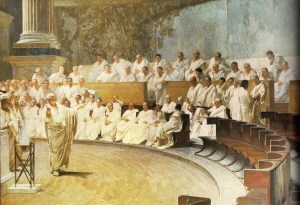 The city states of Greece borrowed their popular assemblies from Syria-Mesopotamia. In Athens, between 508 and 260 before the common era, male citizens met every 10 days to debate and decide laws. Athenian women, slaves, and resident aliens did not get to vote.
The city states of Greece borrowed their popular assemblies from Syria-Mesopotamia. In Athens, between 508 and 260 before the common era, male citizens met every 10 days to debate and decide laws. Athenian women, slaves, and resident aliens did not get to vote.
The Greeks called this demokratia—a form rule by the people. Apparently, women were not people, a view shared by the entire Western world until suprisingly recently.
That aside, the Greeks also introduced trial before elected juries, public vetting of officials, freedom to speak in public, voting by lot, and the ability to expel people from the assembly by popular vote. All important elements of later democracies.
The Greek political systems ended as other have, throughout history. By invasion. Repeated invasions made Greece part of the Roman Empire,
Rome followed the same principle of assemblies from 509 BCE until the Roman Republic ended in 27 BCE with the appointment of the first Roman Emperor.
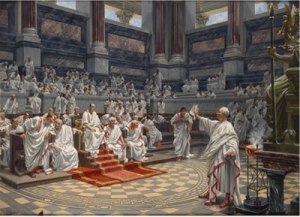 In the Roman Republic, the patricians—the wealthy aristocracy—were initially the only people who could vote and hold offices. The assembly they elected was called the Senate, and it was an advisory body to those assemblies that actually made the rules. However, over 200 years, the plebians gained the right to elect their own kind to the Concilium Plebis, which regulated the plebians.
In the Roman Republic, the patricians—the wealthy aristocracy—were initially the only people who could vote and hold offices. The assembly they elected was called the Senate, and it was an advisory body to those assemblies that actually made the rules. However, over 200 years, the plebians gained the right to elect their own kind to the Concilium Plebis, which regulated the plebians.
Several other assemblies made the laws for specific parts of Roman society. All of them were strongly influenced by the Senate.
Under the emperors, power shifted from representative democracy to imperial authority. Even so, the assemblies continued their governing roles, though the Emperor became the final authority.
Throughout that time, to be elected or appointed to one of the assemblies, a person needed to be male, free, and a citizen of Rome.
Next week, the long gestation of Western democracy
Sourceshttp://www.scholarpedia.org/article/Hunter-Gatherers_and_Play
https://www.google.co.nz/books/edition/Sumer_and_the_Sumerians/eX8y3yW04n4C? pg 30
https://doi.org/10.2307/595104
https://education.nationalgeographic.org/resource/romes-transition-republic-empire
May 31, 2022
Amnesia on WIP Wednesday

Today’s excerpt is from the story I’ve just written for my next newsletter, which I’ll be putting out in the next few days. It uses the amnesia trope, and is set in the same part of the UK, and a few months after, the storm in the Bluestocking Belles collection Storm & Shelter. Indeed, the storm in question sets off the events of the story, and the seaside village of Fenwick-on-Sea comes in for an honourable mention.
All day, Abbey had been following a cart across the field and the rickyard and back, one of three men using pitchforks to lift the hay from the windrows into the cart and then from the cart onto whatever rick was being built. It was one of the skills he had discovered when he was well enough to be put to work. It was exhausting work, but still gave him time — too much time — to think about his dreams.
Were the dreams about his past life? He did not know. He did know he always woke feeling as if he had left something undone and time was running out.
He could no more remember what task he was neglecting than he could remember his own identity.
His ability to build a hay rick was a clue, he supposed. He could plough and scythe, too. And milk a cow. And groom and ride a horse.
He could also read and write. He spoke — or so they told him — like a gentleman. His mind was stuffed with all sorts of knowledge that the farmhands around here found surprising. It was something of a game for them, to ask him a question out of the blue. Name the kings of England. He could do that, yes, and recite the dates, too. He knew the dates of key events in English history. He could finish the verse of popular song if someone called out the first line. He could do it for poetry too, as the local squire discovered.
The squire suggested he might have been the son of a wealthy farmer, sent away to school but still accustomed to helping out on the land.
Abbey wondered why he could access so many facts and skills, but not know who he was, where he was from, or how he arrived on the beach at Dunwich more than half drowned, with a broken arm and a great bleeding wound on his head.
There had been a great storm that had swept all of that coast, cutting Dunwich off from the roads inland and to villages north and south. At a guess, he had been washed overboard from a ship, or had been aboard one of several that had foundered. Nobody knew. The squire made enquiries when he took Abbey into Ipswich to be examined by a doctor. He even sent letters to Lowestoft and Great Yarmouth.
No one had reported losing a man of Abbey’s description and name. If Abbey was his name. It had been the first word on his lips when he recovered consciousness, or so they told him. It didn’t feel as if it fitted, but he had no other name to offer.
The doctor said his memories might come back a few at a time, or all at once, or never. Abbey, still shaky on his legs from his long recovery and with no clues to his own identity, accepted the squire’s offer to return to Dunwich.
He worked on getting fit. He worked on any task he was given as a return for the care and kindness he had been shown. He bludgeoned his mind for the least hint about his past, but all he gained was a headache.
The dreams had started six weeks ago. At first, occasionally but now, every night. They faded as he woke leaving an impression of warm brown eyes, of someone calling for him to come home. Each night, the sense of urgency increased. He had something he needed to do. Quickly, before it was too late.
He had no idea what it was or why it was important.
May 30, 2022
Tea with Lady Clairmont

Serafina Montague, Countess of Clairmont accepted the cup of tea handed to her by the duchess’s companion, and smiled her thanks. While Her Grace was preparing the tea for the four of them, she kept up a light patter of social conversation, and Seffie responded in kind. She might not know London society, but at her estate and in the nearby villages, she was the grand lady, and it was her job to put people at ease.
All the time, she was wondering how to ask for the information she wanted. She was sure the duchess would know. Her Grace reportedly knew everyone who was anyone. But would she tell Seffie the same thing as Lord and Lady Barrington, the only people Seffie knew in the whole of London? “You should not even know that such events exist, Lady Clairmont. Or such men. Nothing good can come of giving you the address. Wait at Clairmont House. Better yet, go home to Clairhaven. No doubt the earl will return when he is ready.”
She brooded over her tea, while her face grew stiff from holding a pleasant expression. She had waited long enough. She wanted to see her husband, and if she had to follow him to a notorious house party, then she would do so. If the duchess would tell her were to go.
When everyone was served, the duchess gave her the cue she needed. “I understand your husband has returned to England, Lady Clairmont. You must be pleased.”
“I have not yet seen my husband, Your Grace,” she said. “I hope I will be pleased once we have met.” She took a deep breath. “I would like your help with that, if you would be so kind.”
The duchess raised interrogatory eyebrows. “In what way?” she asked.
“I need to know the address of a man called Seddon. All I know about him is that he is holding a house party. My husband is at that house party. I plan to go and talk to him.”
The eyebrows lifted still further. “Seddon is not an uncommon name,” she commented, her tone bland.
“I have been told that this Mr Seddon’s house parties are…” she paused, trying to find the right word.
Her Grace completed the sentence for her. “Notorious? If that is the Mr Seddon you are looking for, Lady Clairmont, you must be very careful.”
“I will be careful, but I am not going to wait any longer for Clairmont to find it convenient to remember that I exist.” The sympathy in the duchess’s eyes drew the truth from her. “I have been exchanging letters with Clairmont for twelve years, Your Grace. On paper he seems to be a man I like, but the stories about him do not give me confidence that I will ever have a true marriage. I will, however, have a child, if I can. And for that, I must meet the man. And…” she trailed off, waving a hand to signify the more intimate things she would have to do in order for a child to be a possibility.
The duchess nodded. “Very well. I think I know who can tell me whether the Mr Seddon I am thinking of is currently having one of his house parties, and perhaps even whether Lord Clairmont is in attendance. We shall talk further about how to make sure you are safe at such a house party once I have the information you need.”
Seffie sat back in her chair and took another sip of her tea. She did not yet feel triumph. But she had taken another step towards it.
 The Truant Lord Clairmont
The Truant Lord ClairmontLady Clairmont goes to a scandalous house party to retrieve her truant husband after his return to England from a nine-year absence. What she discovers is unexpected.
A short story in Sunflower SeasonSUNFLOWER SEASON is a charity collection featuring stories (some never-been-published and some old favorites) by over 70 — that’s right — SEVENTY of your favorite Historical Romance authors. ALL royalties will be donated to humanitarian relief in Ukraine. This set will be released on June 7, 2022 and will only be available for a limited time. Preorder now and enjoy a summer of historical romance!
Featuring novellas, stories and novels by Sabrina Jeffries, Christi Caldwell, Amalie Howard, Virginia Heath, Caroline Lee, Golden Angel, Bree Wolf, Lori Ann Bailey, Nicole Locke, Natasha Blackthorne, Royaline Sing, Lenora Bell, Sabrina Jeffries, Amy Quinton, Janna MacGregor, Annabelle Anders, Rachel Ann Smith, Eva Devon, Sandra Sookoo, Tabetha Waite, Diana Bold, Sadie Bosque, Cheryl Bolen, Erica Monroe, Kate Bateman, Cara Maxwell, Tracy Sumner, Jenna Jaxon, Jane Charles, Eliza Knight, Mariah Stone, Robyn DeHart, Wendy LaCapra, Hildie McQueen, Madeline Martin, Amy Rose Bennett, Ava Bond, Kristin Vayden, Piper Huguley, Fenna Edgewood, Kathryn Le Veque, Caroline Linden, Nancy Yeager, Dawn Brower, Celeste Barclay, Lauren Royal, Michele Pollock Dalton, Glynnis Campbell, Rose Pearson, Erica Ridley, Sydney Jane Baily, Deb Marlowe, Rebecca Paula, Amanda Mariel, Christine Sterling, Ava Stone, Lauren Smith, Sawyer Quinn, Caroline Warfield, Jessica A Clements, Jude Knight, Anna St. Claire, Tamara Gill, Gina Conkle, Charlie Lane, Terri Brisbin, Bronwen Evans, Emmanuelle de Maupassant, Merry Farmer, Tammy Andresen, Cecelia Mecca, Meredith Bond, Christine Donovan, Lana Williams, Carrie Lomax, Eve Pendle, Bethany Bennett, Bianca Blythe, Maggie Dallen, Samara Parish, Anna Campbell and more????
Again, ALL proceeds will be donated to Ukrainian relief efforts. We are not affiliated with any charities but are only doing what we can to provide help for the innocent people who’ve lost so much as a result of this senseless tragedy.
Preorder at your favourite retailer. https://books2read.com/Sunflower-Season-For-Ukraine



